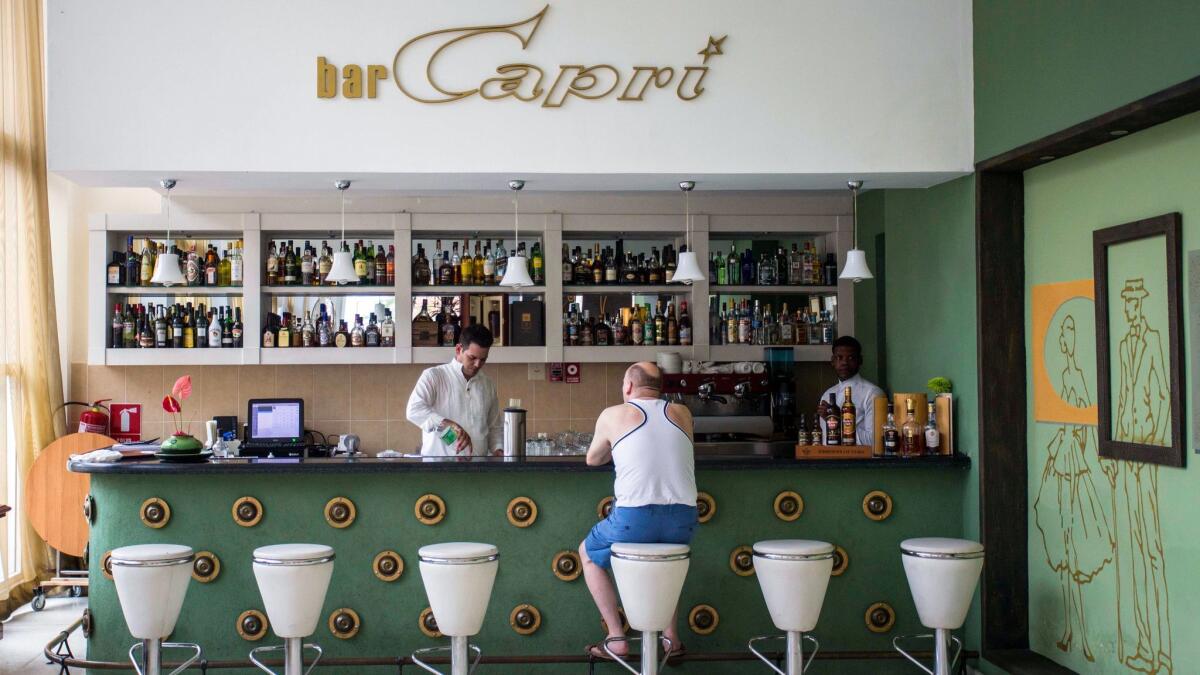What’s the result of new Cuba restrictions? Lots of confusion

Question: I recently booked a cruise for my wife and me that includes two ports of call in Cuba. Are we allowed to go to Cuba on this cruise, given the new regulations?
Patrick King
Ontario
Answer: The short answer is yes, even though coverage of the recent changes might lead you to believe the answer is no.
For King, the best bet is to check with the cruise line to find out what it is doing to meet the new regulations, or whether it’s King’s responsibility to meet them. Here’s why.
The background
Travel to the Cuba of old (before 2014) was expensive and difficult for Americans traveling independently because they were required to apply for a license in one of a dozen or so categories.
Individuals could travel to the island nation, but a group tour operated by travel and Cuba pros was better because they knew the rules and probably were not going to run afoul of them.
Many of those group trips were in a “people-to-people” category in which there were learning experiences each day.
In December 2014 President Obama eased restrictions on travel to Cuba. A physical license was no longer needed, but travelers had to meet conditions (a license, as it were). The trip had to be, say, for a humanitarian project or educational purposes or must provide “support for the Cuban people.” It couldn’t involve beach time designed to improve your tan.
Regular air service, including Alaska Airlines flights from LAX to Cuba, sprouted.
President Trump wanted to tighten some of these regulations, and in November new rules from the Treasury Department’s Office of Foreign Assets Control, or OFAC, were announced.
What’s the result of these changes?
There was immediate confusion. And there is still confusion.
“I think people are having a difficult time understanding what’s legal and what isn’t,” said Janet Moore, owner of Distant Horizons in Long Beach, a company that has led hundreds of travelers to Cuba.
You can sign up for updates on these rules.
What the new regulations do not say
They do not say that everyone has to go with a group.
“That is a misconception,” said Manny Kopstein, chief executive of Cuba Travels Adventure Group. “Individuals before and after the new OFAC regulations could and may continue to travel to Cuba without being part of an organized group.”
But in the OFAC guidelines, there is this message to travelers: “Where specific questions arise about applicability, scope, impact or any other aspects of these sanctions, it is the responsibility of individuals or entities seeking guidance to review the relevant statutes, regulations and Executive Orders, and, if appropriate, consult with legal counsel.” Your program, whether with a group or on your own, must comply with the new regulations, which took effect Nov. 9.
What are some of those regulations?
Here’s where part of the confusion comes in: One of the license categories had been “people to people educational activities,” OFAC said. Individuals or groups could go under that license.
Now, only groups can do that, and those groups must have a designated person “to ensure that each traveler has a full-time schedule of education activities.”
But there is a designation now that is called “support for the Cuban people,” and under this is included “individuals and non-governmental organizations that promote independent activity to strengthen civil society in Cuba.”
If you’re an independent traveler, that’s your ticket in.
That category appears to be fairly elastic under the OFAC rules, Moore said. The rules say the activities must “result in meaningful interactions with individuals in Cuba.” The regulations want these activities to constitute a full-time schedule, which is to say no slacking allowed.
Moore said her company meets the “support for the Cuban people” designation in scores of ways. “You help [the Cuban people] by using the private services they are offering,” she said, including employing experts to lead walking tours, providing lectures, meeting with a private musical group, eating dinner in a private restaurant, using privately licensed drivers and guides and much, much more.
Kopstein’s groups have a philanthropic bent. He takes medicines and hygiene products as well as sporting equipment (his passion is baseball, which works out well in Cuba) to people all over the island.
Are there hotels that are now off limits?
Yes. OFAC does not want tourism to benefit the Cuban military, and the State Department now has a List of Restricted Entities and Subentities Associated With Cuba. These include the new Kempinski as well as some long-established places.
How can mere mortals know all the ins and outs?
They probably can’t, and that’s the problem now with individual travel to Cuba: The new regulations “put the onus for compliance on the traveler,” Kopstein said.
Those individuals must keep good records — and keep them for at least five years. They must know what to avoid and what can be embraced.
Doesn’t that almost force you to go with a group?
Maybe. If you’re not good with details and you’re not good with records, you may not want to risk it.
What about money?
That hasn’t changed. Americans pay a premium for exchanging dollars, which means the exchange rate is not as good. Both Moore and Kopstein have said in previous interviews that they don’t think it’s worth exchanging dollars for euros to get a better rate in the tourist money known as Cuban convertible pesos, or CUCs.
The OFAC says you can now use debit or credit cards, which is great, but few places accept them. Cash, whatever currency you choose, is king.
Have a travel dilemma or question? Write to travel@latimes.com. We regret we cannot answer every inquiry.
More to Read
Sign up for The Wild
We’ll help you find the best places to hike, bike and run, as well as the perfect silent spots for meditation and yoga.
You may occasionally receive promotional content from the Los Angeles Times.







